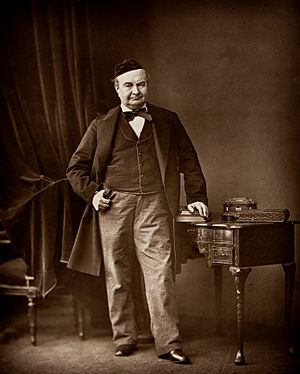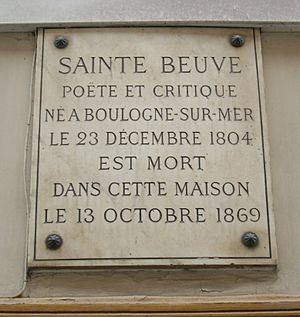Charles Augustin Sainte-Beuve facts for kids
Quick facts for kids
Charles Augustin Sainte-Beuve
|
|
|---|---|
 |
|
| Born | 23 December 1804 Boulogne-sur-Mer, Picardy, France |
| Died | 13 October 1869 (aged 64) Paris |
| Occupation | Literary critic |
| Language | French |
| Nationality | French |
| Alma mater | Collège Charlemagne |
| Notable works | Port-Royal |
Charles Augustin Sainte-Beuve (born December 23, 1804 – died October 13, 1869) was a famous French writer and literary critic. A literary critic is someone who studies, understands, and writes about books and other writings. Sainte-Beuve is known for his detailed essays and for looking closely at the lives of authors to understand their work.
Contents
Early Life and Beginnings
Charles Augustin Sainte-Beuve was born in Boulogne-sur-Mer, a town in France. He went to school there and later studied medicine at the Collège Charlemagne in Paris from 1824 to 1827.
In 1824, he started writing articles about literature for a newspaper called Globe. In 1827, he wrote a review of a book by Victor Hugo, a very important French writer. This review brought him close to Hugo and a group of writers called the Cénacle. This group wanted to create new ideas for a style of writing called Romanticism. Romanticism was a movement that focused on emotions, imagination, and individualism, moving away from older, stricter writing rules.
Interestingly, when Sainte-Beuve became a member of the French Academy in 1845, it was Victor Hugo who gave the speech to welcome him.
A Career in Writing
Sainte-Beuve wrote several collections of poems. He also published a novel called Volupté in 1834, which was partly about his own life. His articles and essays were put together in books like Port-Royal and Portraits littéraires.
During the rebellions of 1848 in Europe, Sainte-Beuve gave talks in Liège about another famous writer, François-René de Chateaubriand. He returned to Paris in 1849 and started a popular series of weekly columns called Causeries du lundi, which means 'Monday Chats'. These were published in the newspaper Le Constitutionnel.
Later, when Louis Napoleon became Emperor, he made Sainte-Beuve a professor of Latin poetry at the Collège de France. However, some students who did not support the Emperor protested against Sainte-Beuve, so he decided to resign from the position.
His Masterpiece: Port-Royal
After writing poetry and a couple of novels that were not very successful, Sainte-Beuve started doing deep research into literature. His most important work from this time is Port-Royal.
Port-Royal (published between 1837 and 1859) is often seen as Sainte-Beuve's greatest work. It is a very detailed history of the Jansenist abbey of Port-Royal-des-Champs, which was a religious community near Paris. This book was important not just for understanding religious history, but also for how people studied history and art in general.
Later Life and Ideas
In 1865, Sainte-Beuve became a Senator. In this role, he was known for speaking up for freedom of speech and the freedom of the press. He believed people should be able to express their ideas freely.
A writer named Jules Amédée Barbey d'Aurevilly once said that Sainte-Beuve was "a clever man with the temper of a turkey!" In his last years, Sainte-Beuve was often ill and lived a quiet life.
One of Sainte-Beuve's main ideas about criticism was that to truly understand an artist and their work, you needed to know about the artist's life. However, another famous writer, Marcel Proust, disagreed with this idea. Proust wrote a series of essays called Contre Sainte-Beuve ("Against Sainte-Beuve") to explain why he thought the artist's life was separate from their art. Proust later developed these ideas further in his very long novel, À la recherche du temps perdu.
Publications
Non-fiction
- Tableau Historique et Critique de la Poésie Française et du Théâtre Français au XVIe Siècle (1828)
- Port-Royal (1840–1859)
- Causeries du Lundi (1851–1881)
- Nouveaux Lundis (1863–1870)
Fiction
- Volupté (1834)
- Madame de Pontivy (1839)
Poetry
- Vie, Poésies et Pensées de Joseph Delorme (1829)
- Les Consolations (1830)
- Pensées d'août (1837)
In English translation
- Portraits of Celebrated Women (1868)
- Monday-chats (1877)
- Selected Essays (1963)
See also
 In Spanish: Charles Augustin Sainte-Beuve para niños
In Spanish: Charles Augustin Sainte-Beuve para niños
 | Anna J. Cooper |
 | Mary McLeod Bethune |
 | Lillie Mae Bradford |


